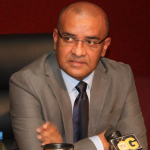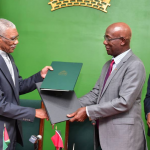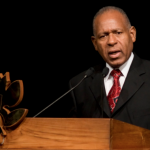
(Trinidad Express) Trinidad and Tobago Attorney General Anand Ramlogan has described as “mischievous, malicious and very dangerous” charges of racial and religious discrimination in the arrest of people or racial profiling in the deportation of illegal immigrants by the Government of the People’s Partnership.
Ramlogan said statistics from 2010 to October 2014 showed “the number one country with deportees from Trinidad and Tobago is not the African continent, not India, but Guyana. “The truth of the matter is that illegal immigrants from the African continent were way down on the list at number seven. The total number of African immigrants that have been deported from 2010 to now is 70 persons. Seventy African deportees in four, nearly five, years, against 734 Guyanese (in the same period).
“So when we run to light a fire, coming on the heels of the Ferguson experience in the US and we jump to pour kerosene to light a social flame that we cannot control, then we must look to the truth which shall set us free. And the statistics show that we must reject outright that kind of nonsense and absurd allegation against the Government of Trinidad and Tobago.”
There is absolutely no merit, truth or justification in it, he said, adding it was mischievous, malicious and very dangerous in a society such as this.
Statistics:
1,757 deported
He said he asked for statistics from the head of Immigration, Gerry Downes, because he wanted to see if there was any merit in this charge about discrimination against deportees from Africa.
The statistics provided revealed out of a total of 1,757 deportees between 2010 and now, 41.8 per cent of deportees (734) were from Guyana. He said coming second after “with a big gap”, was Jamaica, the country of origin of 18.5 per cent of deportees (325 people).
Other Caribbean countries (Dominican Republic, Cuba, Haiti, Dominica) were third, with 11.4 per cent of deportees; fourth was Asia (China, Indian and other Asian countries), with 10.2 per cent; fifth was Central and South America (5.7 per cent); sixth was Caricom countries (excluding Guyana and Jamaica), 5.7 per cent.
Speaking in the Senate on the Precursor Chemicals Bill, Ramlogan said: “We have a tendency in Trinidad to call upon the law enforcement officers to do their duty and enforce the law… and when they do… the very same people criticise and condemn them. The latest trend is if you arrest anybody—racial profiling, religious profiling. I don’t know what they expect the police to do.
“It is high time that we stop this hypocritical behaviour in Trinidad and Tobago and allow the law enforcement agencies to do their job as we were trained to do.”
The Attorney General said one had to be careful about pouring scorn on reports from security agencies in the country. He said on the African continent there was a “huge opium/heroin trade” and there was piracy on the high seas, therefore “one cannot bury one’s head in the sand”.
Ramlogan said Trinidad and Tobago could not remain nonchalant in the face of entrepreneurial drug cartels which have already tried to use countries of the Caribbean to divert chemicals.
He quoted a 2006 International Narcotics Control Strategy Report which stated: “Trinidad and Tobago has an advanced petrochemical sector, which requires the import and export of chemicals that can be diverted for the manufacturing of cocaine hydrochloride. Precursor chemicals originating from Trinidad and Tobago have been found in illegal drug labs in Colombia.”
He said in a 2007 United Nations Office on Drugs and Crime Training Manual, an example of diversion was cited.
“A Mumbai-based exporter presented to the Narcotics Commissioner of India a No Objection Certificate from the Competent Authority of the importing country for export of two million ephedrine tablets to Trinidad and Tobago. Suspicion led to enquiry, which confirmed that the actual quantity permitted in the NOC was 200,000 tablets only.”
He said according to the United Nations Office on Drugs and Crime World Drug Report 2014, cocaine supply indicators showed that the Central and South America and the Caribbean seizures in 2011-2012 amounted to over 70 per cent of global total. “This is a damning statistic and certainly supports the need for stricter controls on cocaine production,” he said.
-Filed 10th December 2014

















2 Responses to "Guyana tops List of Deportees from Trinidad and Tobago"
You must be logged in to post a comment Login